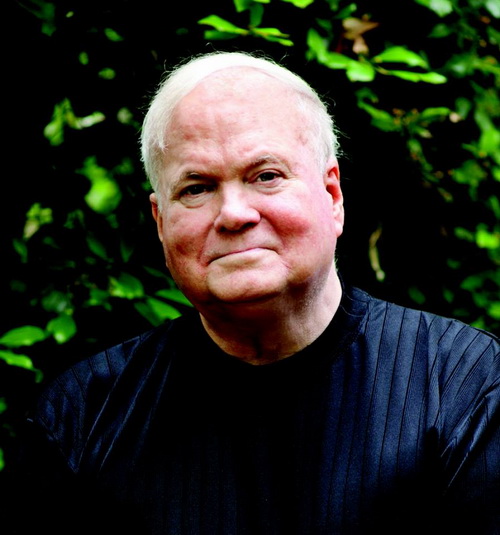PAT CONROY: A SOUTHERN VOICE FOR THE AGES
By Bob Vickrey
When best-selling author Pat Conroy was once asked by his literary agent why there was not more sex in his novels, he responded, “Because my grandmother is still alive.”
When he told that story at book signings and speaking events, there was always an eruption of laughter and applause in the room. Everyone in attendance fully understood the precarious minefield a writer navigates when it comes to family matters.
Nevertheless, after more than four decades of writing about family, there are legions of his loyal fans who would attest to the boldness of his work. His novels, The Great Santini and The Prince of Tides, were bothfictionalized chronicles of the tumultuous Conroy family household that endured the tyrannical behavior of their Marine Corps fighter-pilot husband and father.
When news of the author’s recent death was announced, an incredible outpouring of tributes ensued in the days afterward. Conroy died March 4th in Beaufort, South Carolina after having been diagnosed with pancreatic cancer several weeks ago. When the announcement was placed on Facebook shortly after the diagnosis, two million responses were posted on his site within the first two days.
Pat Conroy’s interest in writing started early in life as his mom read stories to him and his siblings when they were growing up. He inherited his gift naturally as he followed in the great Southern storytelling tradition of Faulkner, Wolfe, Fitzgerald, and O’Connor. He continued that long lineage of storytelling about a region that has produced writers as one of its most precious exportable commodities.
His imaginatively evocative passages describing South Carolina’s “low country” captured the beauty of its scenic marshlands and fragile estuaries that were an integral part of his boyhood.
But his prose was perhaps even more powerful when he described growing up in his fractured family. Conroy’s fictional stories could hardly conceal the fact that he was writing about his own tormented childhood. His candid examination of a tortured upbringing represented a lifelong quest to heal those seemingly indelible scars of his past.
When the manuscript of The Prince of Tides first arrived at my doorstep one evening in 1986, I read into the early morning hours before reluctantly putting the rest of the bulking stack of pages aside until the following day. I knew that my friend had been busy working on the novel that would ultimately transform him into the publishing star he was destined to become, but I wasn’t quite ready for the force and power that his new book would deliver on such a personal level. It mesmerized me like few other books had, and I knew at once that Pat had written his definitive work.
Back then, I worked for Houghton Mifflin, the publisher of Conroy’s earliest books, and was responsible for bookstore sales and promotion in several Southwestern states.
Pat and I had been introduced in Boston when I first joined the publishing firm. The Water is Wide had just been published and he was in town visiting his editor and publicist. We went to dinner that evening and talked about how we both had landed in our various roles at Houghton—he, as a struggling writer, and I, as a fledgling publisher’s representative who would be promoting his book in my Southwestern territory.
Our bond was formed as we both began our new careers. I made the observation during dinner that this represented the first time someone had paid him to write—and someone had paid me to read. He responded, “Yes, but not very much.”
During the promotion of The Great Santini in 1976, I picked him up at Houston’s Intercontinental Airport and we headed off to do newspaper interviews and local afternoon talk shows throughout the Southwest. The book received extensive review attention and later became a hit movie. By then, everyone in the company realized that we had a true star in the making.
A decade later, the company’s initial launch for The Prince of Tides was planned for the American Booksellers Association meeting in New Orleans. The weekend culminated with a huge breakfast gathering that featured Conroy and legendary newsman Walter Cronkite as speakers.
During Cronkite’s eloquent and adoring introduction of Conroy, he said, “It must be a good feeling to be able to string together those beautiful lovely words in a necklace of incomparable prose.” He declared his envy of Conroy’s gift of storytelling, but suggested that Pat had been born with a distinctive advantage of “having been blessed with an Irish muse.”
Conroy’s impassioned speech that day inspired the crowd of booksellers, and eventually became part of publishing lore. He told of his mother’s infinite influence on his career and how her ongoing encouragement had led him to become the “Southern writer” she had always wanted him to be. He said, “It is my mother’s voice that I speak in today. It is the power of her voice that moves me to write. My mother taught me what we all look for as writers. It is the moment when language and passion and the beauty of writing all come together.”
Conroy’s appearance had helped successfully launch his most important book to date, and sent booksellers home spreading the word about his novel like new-born messengers who had just discovered religion. The Prince of Tides became the most talked about American novel later that year and eventually spent 51 weeks on the New York Times Bestseller list.
The book also secured his place among the very best contemporary American writers, and its success created enormous anticipation for each succeeding book. Beach Music, My Losing Season, South of Broad, and My Reading Life each resonated with his fans in succeeding decades.
Conroy best summed up his writing life and career when he related the story of his mother’s final bout with cancer that would ultimately take her life. He described Peggy Conroy as the prettiest woman he’d ever seen, but in her last days while suffering from diarrhea and vomiting, had been reduced to a mere 80 pounds.
He said she looked up from her bed and said, “When you write about me, don’t make me like this. Promise to make me beautiful again.”
Conroy said “From that moment on, I loved being a Southern writer.”
He said, “Momma, I’m going to make you so beautiful.
And because you taught me how to be a writer,
I can lift you off that bed and I can set you singing; I can set you dancing;
And I can make you beautiful again for the entire world to see.”
Just before his mother slipped into a coma, his brothers and sisters sat around her bedside and read her poetry throughout the night. They sent her off that evening in what Pat described as a “wave of language.”
Pat Conroy always believed it is that “wave of language” which binds us together as writers and readers. Many of us believe he successfully accomplished his mission.
Bob Vickrey is a writer whose columns appear in several Southwestern newspapers including the Houston Chronicle. He is a member of the Board of Contributors for the Waco Tribune-Herald and a regular contributor to the Boryana Books website. He lives in Pacific Palisades, California.
Comments
Leave a Reply
You must be logged in to post a comment.






